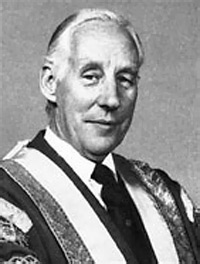
(Contributed by Mr Philip Harris)
John Gillingham was born in Dorchester, Dorset, England on March 15, 1916.
He had an outstanding career in the Medical School of St Bartholomew’s Hospital, London, qualifying MB.BS in 1938, later undertaking neurosurgical training under Mr John O’Connell and Mr (later Sir) Hugh Cairns.
He joined the Royal Army Medical Corps(RAMC) in 1941 and later, as a neurosurgeon became officer Commanding the number 4 Neurosurgical Unit, serving in the Middle East and in Italy, later being awarded the MBE and, in 1981, CBE. I first met him as a fellow officer in the Military Hospital for Head Injuries in Oxford.
In 1947 he gained the FRCS Eng. and later was made a Fellow, ad eundem, of the RCS Edin. and the RCP Edin. In later years he was made an honorary Fellow of the surgical colleges of Australia, Ireland, South Africa, Sri Lanka and Glasgow and awarded an honorary MD of Thessalonika.
The year 1950 saw him taking up appointment of Consultant Neurosurgeon in Edinburgh and Senior Lecturer in Edinburgh University where, in 1963, he succeeded Professor Norman Dott in the chair of Surgical Neurology.
His main interests in neurology were head injuries, following his experience in the RAMC, including their prevention, intracranial vascular lesions, especially cerebral aneurysms, and stereotactic cerebral surgery. He developed the latter initially with Dr. George Guiot of Paris. It was mainly used to treat patients with Parkinson’s Disease, but others with a variety of involuntary trunk and limb movements were also treated. Many of his lectures and the papers he had published were on these and other aspects of neurosurgical disease and trauma.
He received honours from many universities and neurosurgical organisations and was elected President of the European Society of Stereotactic and Functional Neurosurgery. In 1970 he was elected a Fellow of the Royal Society of Edinburgh and in 1979 President of the Royal College of Surgeons of Edinburgh where he introduced some important changes in the College’s examination system and played an important role in developing a new Symposium Hall.
On retiring from the Chair in 1981 he took up an appointment in the King Saud University in Riyadh, Saudi Arabia.
He had married Judy in 1945. They had four sons but tragically Jeremy died in a skiing accident.
